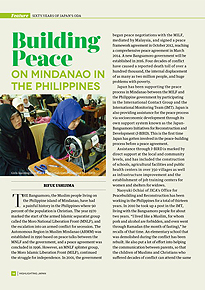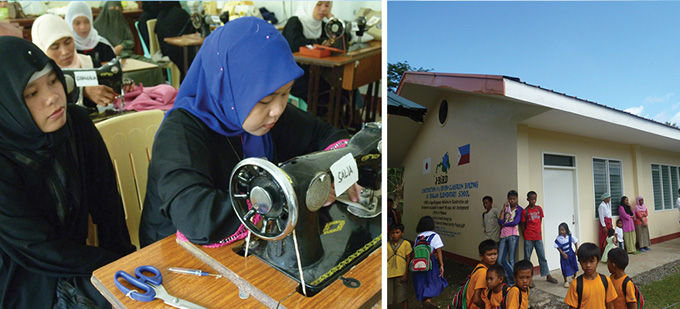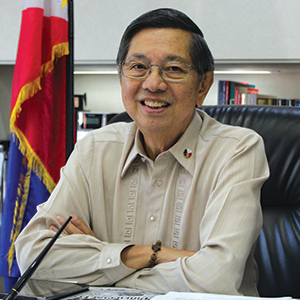Home > Highlighting JAPAN >Highlighting Japan August 2014>Sixty Years of Japan's ODA
Highlighting JAPAN

Sixty Years of Japan's ODA
Building Peace
on Mindanao in the Philippines

The Bangsamoro, the Muslim people living on the Philippine island of Mindanao, have had a painful history in the Philippines where 90 percent of the population is Christian. The year 1970 marked the start of the armed Islamic separatist group called the Moro National Liberation Front (MNLF), and the escalation into an armed conflict for secession. The Autonomous Region in Muslim Mindanao (ARMM) was established in 1990 based on peace talks between the MNLF and the government, and a peace agreement was concluded in 1996. However, an MNLF splinter group, the Moro Islamic Liberation Front (MILF), continued the struggle for independence. In 2001, the government began peace negotiations with the MILF, mediated by Malaysia, and signed a peace framework agreement in October 2012, reaching a comprehensive peace agreement in March 2014. A new Bangsamoro government will be established in 2016. Four decades of conflict have caused a reported death toll of over a hundred thousand, the internal displacement of as many as two million people, and huge problems with poverty.
Japan has been supporting the peace process in Mindanao between the MILF and the Philippine government by participating in the International Contact Group and the International Monitoring Team (IMT). Japan is also providing assistance for the peace process via socioeconomic development through its own support system known as the Japan-Bangsamoro Initiatives for Reconstruction and Development (J-BIRD). This is the first time Japan has gotten involved in the peace-building process before a peace agreement.
Assistance through J-BIRD is marked by direct support at the local and community levels, and has included the construction of schools, agricultural facilities and public health centers in over 350 villages as well as infrastructure improvement and the establishment of job training centers for women and shelters for widows.
Naoyuki Ochiai of JICA’s Office for Peacebuilding and Reconstruction has been working in the Philippines for a total of thirteen years. In 2010 he took up a post in the IMT, living with the Bangsamoro people for about two years. “I lived like a Muslim, for whom pork and alcohol are forbidden, and even went through Ramadan (the month of fasting),” he recalls of that time. An elementary school that was demolished during the conflict has been rebuilt. He also put a lot of effort into helping the communication between parents, so that the children of Muslims and Christians who suffered decades of conflict can attend the same school. Steady efforts like this, conducted while building relationships of trust with local people, are the driving force behind J-BIRD.
Until the Bangsamoro government actually becomes functional, J-BIRD will be drafting laws and training administrative officials to operate the new government. Mid- to-long-term economic development such as planning for social infrastructure like roads is also moving ahead.
Moreover, with an environment suitable for buckwheat cultivation and growing bananas, Mindanao has caught the eye of private Japanese businesses as a location for new primary industries. The entry of Japanese companies would make economic development more promising, but that too will be difficult if the security situation does not stabilize. Solving the issue of poverty will also require peaceful conditions.
“What’s crucial is building a relationship of trust between the national government and the community,” says Ochiai. Although there are many challenges for the establishment of the new government, he will continue making steady progress just as before for the sake of peace for the Bangsamoro people.
An Interview with His Excellency Mr. Manuel M. Lopez
from the Embassy of the Republic of t
he Philippines in Japan
By Noam Katz
The Philippines-Japan relationship is quite strong, probably at its finest right now. Japan’s foreign direct investments (FDI) and ODA have really helped spur the economic growth of my country during the last few years. Japan is the number one country now in terms of our bilateral foreign trade and export destinations and ranks third in FDI. It is also number one in terms of ODA to the Philippines, and it’s been very instrumental in providing us with much-needed infrastructure.
The Mindanao population’s feelings on Japan’s support for our peace process is very positive. Japan was already providing a lot of help to the Muslim communities there. As a result of the J-BIRD project, which provides grassroots technical assistance and livelihood opportunities for jobs and employment in that area, people there can now live in peace. So this peace is the biggest benefit of all. In 2011, Japan hosted talks between His Excellency President Aquino and the MILF leadership, which helped build trust between the parties. My country thus owes a debt of gratitude to Japan for being instrumental in paving the way—in terms of supporting the peace process and development—toward the landmark peace agreement signed last March 27, 2014.
I know that Japan will continue to be a catalyst for development in Mindanao. With the peace agreement signed and the Bangsamoro autonomous political entity soon in place, if the Japanese government and Japanese companies invest in that region, there will be job creation and opportunities for the people there. Whether through agribusiness or in the setting up of factories, people will be employed and their quality of life is expected to be much better.
Arigato gozaimasu.
© 2009 Cabinet Office, Government of Japan







